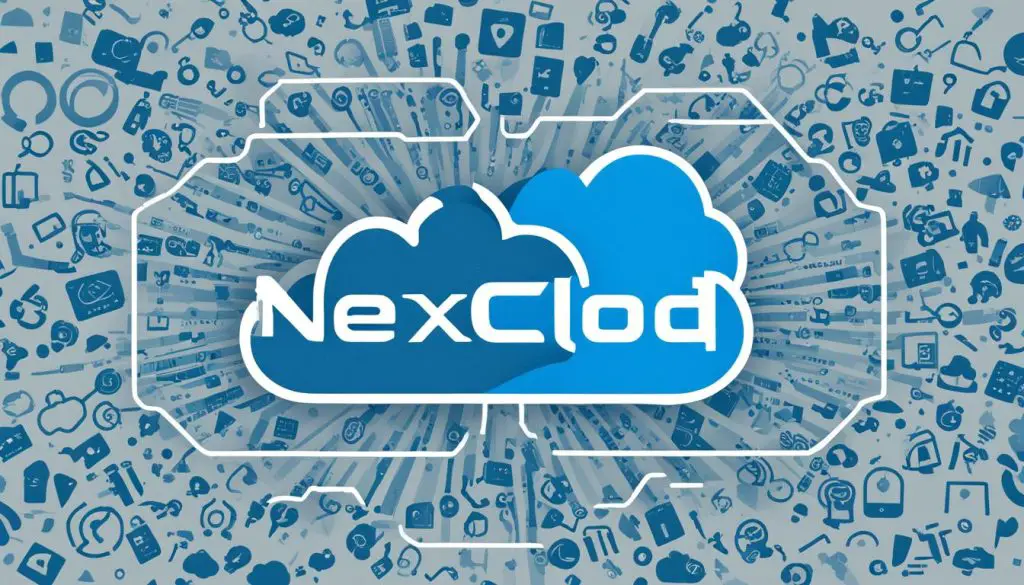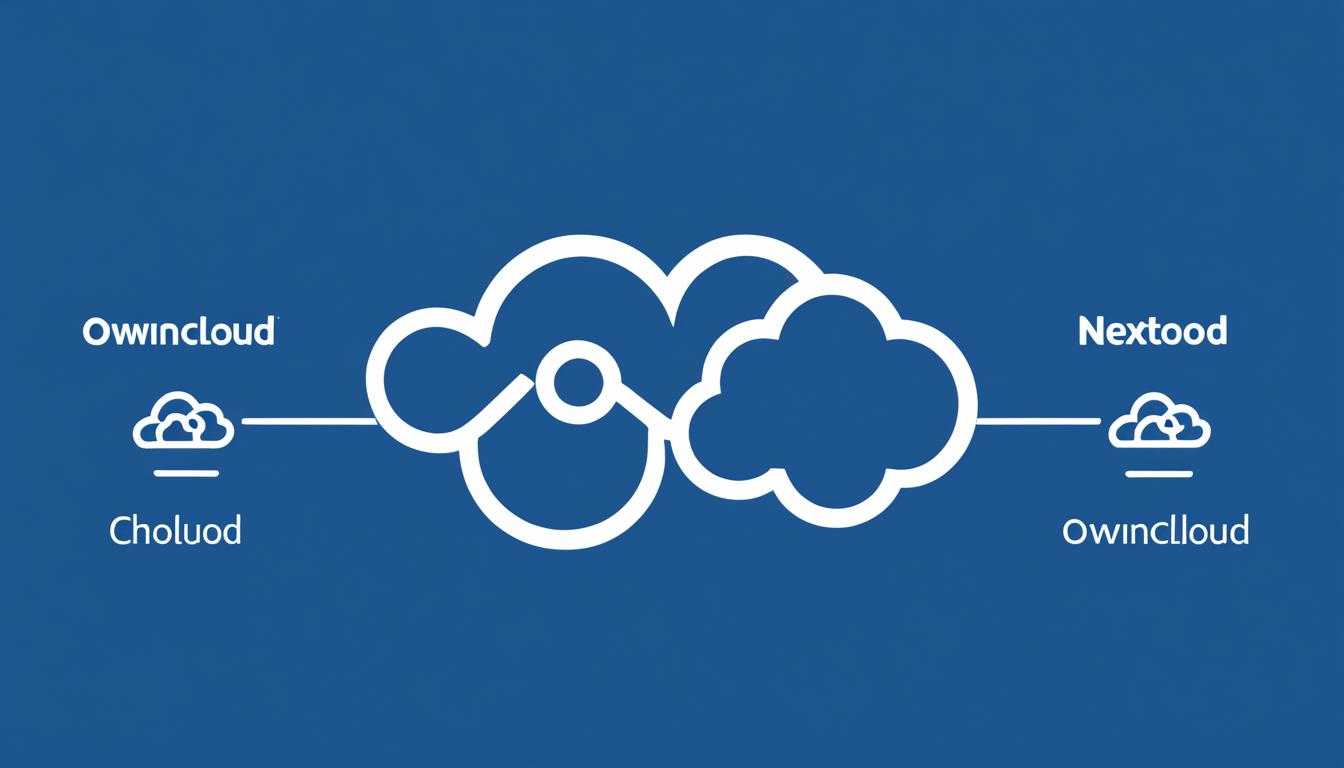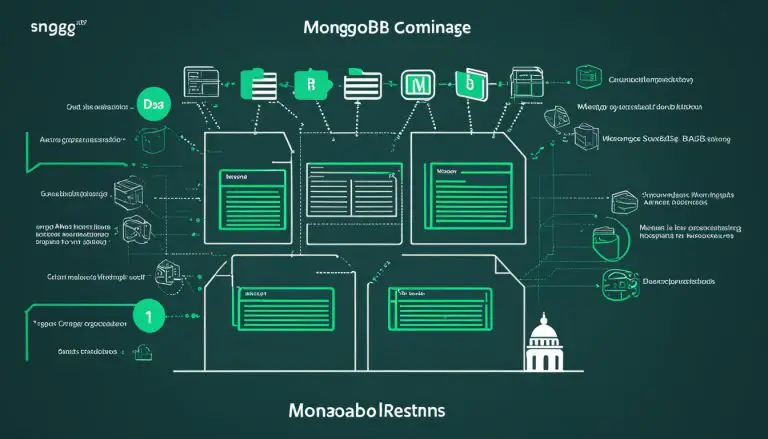Nextcloud vs Owncloud: Choosing the Best Option
When it comes to cloud storage platforms, Nextcloud and Owncloud are two popular choices that often come up in the conversation. Both platforms offer similar features, making it challenging to decide which one is the best option for your needs. In this article, I will compare Nextcloud and Owncloud based on their features, security, and user experience, helping you make an informed decision.
Key Takeaways:
- Nextcloud and Owncloud are both powerful cloud storage platforms.
- The choice between the two depends on specific needs and preferences.
- Consider factors such as security, scalability, customization, and pricing when making a decision.
- Nextcloud emphasizes advanced features, security, and a community-driven ecosystem.
- Owncloud focuses on enterprise-grade file collaboration and secure file sharing.
What is Nextcloud?
Nextcloud is an open-source self-hosted software for storing data online. It allows users to store, sync, and share files securely without relying on third-party hosting services.
Nextcloud offers a wide range of features such as:
- File syncing
- File sharing
- Collaborative editing
- Calendar and contact management
Nextcloud can be installed on various operating systems and gives users complete control over their data.
With Nextcloud, you can easily access your files from anywhere and collaborate with others in real-time. Whether you’re working on a team project or sharing files with friends and family, Nextcloud provides a secure and reliable self-hosted cloud storage solution.
What is Owncloud?
Owncloud is a versatile open-source cloud storage platform that caters to the needs of enterprise-grade file collaboration. With Owncloud, users can securely store, sync, and share files, making it an ideal choice for businesses and organizations that prioritize data security and collaboration.
One of the major advantages of Owncloud is its comprehensive range of features. Users can take advantage of file syncing capabilities, ensuring that their files and folders are always up to date across devices. The platform also offers secure file sharing, allowing users to effortlessly collaborate with colleagues, clients, and partners by providing controlled access to specific files or entire folders.
Owncloud provides encryption to safeguard sensitive data and offers seamless integration with popular applications such as Google Drive and Dropbox. This integration allows users to centralize their data management and enjoy the convenience of accessing files from multiple platforms.
In addition to its features, Owncloud is renowned for its strong emphasis on security. The platform offers advanced security measures to protect user data, including encryption technologies and access controls. Owncloud also supports two-factor authentication, adding an extra layer of security to ensure that only authorized individuals have access to sensitive information.
Overall, Owncloud is a highly secure and feature-rich cloud storage platform that provides enterprise-grade file collaboration capabilities. With its emphasis on security, advanced features, and seamless integration with popular applications, Owncloud is a reliable choice for businesses and organizations seeking secure file sharing and efficient data management.
Features Comparison
Both Nextcloud and Owncloud offer a wide range of features that make them popular choices for cloud storage. Let’s take a closer look at how these two platforms compare in terms of performance and security.
Performance
Nextcloud and Owncloud provide similar file syncing, sharing, and collaboration tools, ensuring seamless and efficient workflows. However, Nextcloud edges ahead in terms of performance with its constant addition of new features and focus on delivering the best user experience.
Security
When it comes to security, both Nextcloud and Owncloud prioritize protecting user data. Both platforms offer encryption, access controls, and two-factor authentication. However, Nextcloud places a stronger emphasis on security, providing more advanced security features to ensure the integrity and confidentiality of your files and data.
“With Nextcloud’s advanced security features, you can have peace of mind knowing that your data is protected. From server-side encryption to external key management systems, Nextcloud prioritizes your data security.”
On the other hand, Owncloud focuses on improving its file-sharing features and integration with popular applications, providing a secure environment for collaborative work.
To summarize, both Nextcloud and Owncloud offer reliable performance and robust security features. Nextcloud stands out for its constant innovation and focus on user experience, while Owncloud places emphasis on file-sharing capabilities and application integration. Consider these differences when choosing the right cloud storage platform for your needs.
Pricing and Licensing
When it comes to pricing and licensing, Nextcloud and Owncloud have different approaches. Nextcloud offers a variety of pricing options to cater to different needs. They have a free version that allows users to self-host their cloud storage, making it a cost-effective option. Additionally, Nextcloud offers paid enterprise versions with additional features and support for those who require more robust solutions.
On the other hand, Owncloud also provides a free community version for users to get started. They also offer paid enterprise versions that come with support and additional features.
Both Nextcloud and Owncloud are open-source platforms, but there are some differences in their approach. Nextcloud has a more community-driven approach, constantly improving and expanding its features based on user feedback and contributions. On the other hand, Owncloud aims to strike a balance between the needs of the open-source community and the demands of the enterprise market.
When considering the pricing and licensing aspect, it is important to evaluate your specific requirements and budget to determine which option is the most suitable for you.
Ecosystem and Integration
Nextcloud and Owncloud boast robust ecosystems with a diverse array of apps and integrations, making them highly versatile and adaptable platforms. Let’s delve into the specifics of each:
Nextcloud Ecosystem
Nextcloud benefits from an active community of developers who consistently contribute to the platform’s growth and enhancement. This collaborative effort has resulted in a rich ecosystem of apps and plugins, further expanding the functionality and capabilities of Nextcloud. Users can explore and integrate a wide range of applications, optimizing their cloud storage experience based on their specific needs and preferences.
Owncloud Integrations
Owncloud also offers a variety of third-party integrations and extensions, enabling users to seamlessly connect with popular applications. With these integrations, users can leverage the power and convenience of applications like Google Drive and Dropbox, enhancing their file collaboration and sharing capabilities. Owncloud prioritizes providing a seamless experience by seamlessly integrating with well-established productivity tools, like OnlyOffice and Collabora Online.
Both Nextcloud and Owncloud understand the importance of offering integration options to streamline workflows and improve productivity. By facilitating integration with various platforms and applications, users can maximize the potential of their cloud storage and create a cohesive working environment.
User Experience
When it comes to user experience, both Nextcloud and Owncloud offer intuitive and user-friendly interfaces. Users will find similarities in the layout and navigation of both platforms, making it easy to navigate and access their files.
Nextcloud and Owncloud provide desktop clients and mobile apps, ensuring that users have convenient access to their files on various devices and platforms. Whether you’re at your desk or on the go, you can easily sync, share, and collaborate on your files.
One area where Nextcloud stands out is its commitment to accessibility. Nextcloud provides features specifically designed for visually impaired users, ensuring that everyone can have a seamless and inclusive cloud storage experience.
On the other hand, Owncloud focuses on enhancing its file-sharing capabilities and integration with popular applications. Its simple user interface makes it easy for users to navigate and leverage its file-sharing features without any hassle.
Take a look at the image below to get a glimpse of the user interface of both platforms:
“The user experience of both Nextcloud and Owncloud is designed to be user-friendly, allowing individuals and organizations to easily manage their files and collaborate efficiently.”
Support and Documentation
When it comes to providing support and documentation, both Nextcloud and Owncloud prioritize their users’ needs.
Nextcloud offers a variety of support channels to cater to different levels of subscription. Users can access a customer portal, reach out via phone, or send inquiries through email. The response time varies depending on the subscription level, ensuring that users receive timely assistance for their concerns.
Owncloud also offers customer support through a dedicated customer portal and email communication. The support team is committed to helping users resolve any issues they may encounter while using the platform.
Both Nextcloud and Owncloud understand the importance of comprehensive documentation to help users set up and make the most of their cloud storage. They provide extensive documentation that covers various aspects of installation, configuration, and usage. This documentation serves as a valuable resource for users to find answers to their questions and navigate the platforms efficiently.
Overall, Nextcloud and Owncloud prioritize their users’ satisfaction by offering reliable support channels and comprehensive documentation to ensure a smooth experience with their cloud storage platforms.
Security and Privacy
When it comes to cloud storage, security and privacy are of utmost importance. Both Nextcloud and Owncloud prioritize these aspects and offer a range of security features to protect user data.
Both platforms provide encryption, access controls, and two-factor authentication as standard security measures. These features ensure that files are safeguarded and privacy is maintained.
Nextcloud Security
Nextcloud goes above and beyond in terms of security. It offers advanced features like server-side encryption, which adds an extra layer of protection to user data.
In addition, Nextcloud allows external key management systems and supports hardware security modules. These features enhance the security of the platform and give users peace of mind.
Owncloud Security
Owncloud also places a strong emphasis on security. It focuses on securing stored data by offering robust encryption options.
Moreover, Owncloud integrates seamlessly with popular cloud storage platforms, enabling users to leverage additional security measures provided by these platforms.

Overall, both Nextcloud and Owncloud prioritize security and offer users a secure environment to store and share their data. While Nextcloud offers advanced security features, Owncloud’s integration capabilities enhance the overall security of the platform.
Performance and Scalability
Both Nextcloud and Owncloud are capable of handling large amounts of data and offer good performance for cloud storage. However, Nextcloud has a distinct advantage when it comes to scalability, making it the preferred choice for organizations with larger user bases and higher data volumes.
Nextcloud offers several features to optimize storage and bandwidth usage, including file lifecycle management and a virtual file system. These features enable Nextcloud to efficiently handle and organize data, ensuring smooth performance even with extensive user activity and high data loads.
While Owncloud also provides good performance, it may have limitations in terms of scalability compared to Nextcloud. Organizations that require a cloud storage solution that can easily scale with their growing data needs may find Nextcloud to be the more suitable option.
With Nextcloud’s emphasis on scalability and enhanced performance optimization features, users can trust that their cloud storage environment will remain robust and efficient, even as their data requirements expand over time.
Customizability and Flexibility
Nextcloud and Owncloud offer users the ability to customize their cloud storage experience and provide flexibility in terms of features and integrations. Whether you choose Nextcloud or Owncloud, you have the freedom to tailor your cloud storage platform to meet your specific needs.
Nextcloud takes customizability to the next level by offering custom theming options. This means users can personalize the interface of their cloud storage, creating a unique and branded experience. Whether you want to match your company’s branding or simply prefer a specific aesthetic, Nextcloud allows you to make it your own.
Owncloud also understands the importance of customization. It provides users with various customization options, allowing them to configure their cloud storage platform to suit their preferences. Additionally, Owncloud offers integration capabilities with popular applications, enhancing its flexibility and functionality.
Both Nextcloud and Owncloud can be self-hosted, giving users full control over their data and deployment options. This means you have the flexibility to choose where and how your data is stored, ensuring it meets your security and privacy requirements.
By offering customization options and flexibility, Nextcloud and Owncloud empower users to create a cloud storage experience that aligns perfectly with their unique needs and preferences.
“The ability to customize our cloud storage interface through Nextcloud’s theming options has allowed us to create a seamless and branded experience for our users.”
Conclusion
In conclusion, both Nextcloud and Owncloud are powerful cloud storage platforms with similar features. The choice between the two largely depends on your specific needs and preferences.
Nextcloud offers a stronger emphasis on security, with advanced features and a more active and community-driven ecosystem. With its constant addition of new features and focus on user experience, Nextcloud provides a comprehensive solution for individuals and organizations seeking secure and flexible cloud storage.
On the other hand, Owncloud specializes in enterprise-grade file collaboration and places great importance on secure file sharing and integration with popular applications. If your primary requirement is seamless integration with existing tools and a focus on file-sharing capabilities, Owncloud may be the ideal choice for you.
When making your decision, it is essential to consider factors such as pricing, security, scalability, and customization options. Evaluate your specific needs and requirements to choose the cloud storage platform that best suits your organization’s goals and objectives.
FAQ
What is Nextcloud?
Nextcloud is an open-source self-hosted software for storing data online. It allows users to store, sync, and share files securely without relying on third-party hosting services. Nextcloud offers a wide range of features such as file syncing, sharing, collaborative editing, calendar and contact management, and more. It can be installed on various operating systems and gives users complete control over their data.
What is Owncloud?
Owncloud is another open-source cloud storage platform that focuses on enterprise-grade file collaboration. It allows users to store, sync, and share files securely and offers features like file syncing, sharing, encryption, and integration with popular applications like Google Drive and Dropbox. Owncloud is known for its strong emphasis on security and offers a range of advanced security features to protect user data.
How do Nextcloud and Owncloud compare in terms of features?
Nextcloud and Owncloud offer similar features such as file syncing, sharing, and collaboration tools. However, there are some differences in their performance and security capabilities. Nextcloud is known for constantly adding new features and focuses on providing the best user experience. On the other hand, Owncloud focuses on improving its file-sharing features and integration with popular applications.
What are the pricing and licensing options for Nextcloud and Owncloud?
Nextcloud offers a range of pricing options, including a free version for self-hosting and paid enterprise versions with additional features and support. Owncloud also offers a free community version and paid enterprise versions with support and additional features. Both platforms are open-source, but Nextcloud has a more community-driven approach while Owncloud focuses on striking a balance between the needs of the open-source community and the demands of the enterprise market.
What is the ecosystem and integration like for Nextcloud and Owncloud?
Nextcloud and Owncloud have thriving ecosystems with a wide variety of apps and integrations. Nextcloud has an active community of developers who constantly contribute to the platform, resulting in a rich ecosystem of apps and plugins. Owncloud also has a range of third-party integrations and extensions that allow users to connect with popular applications. Both platforms offer integration with popular productivity tools such as OnlyOffice and Collabora Online.
How is the user experience of Nextcloud and Owncloud?
Nextcloud and Owncloud have similar user interfaces and provide a user-friendly experience. Both platforms offer desktop clients and mobile apps for easy access to files on the go. Nextcloud is known for its commitment to accessibility and provides features for visually impaired users. Owncloud has a simple user interface and focuses on improving its file-sharing features to integrate with popular applications.
What kind of support and documentation do Nextcloud and Owncloud offer?
Nextcloud provides support channels like customer portal, phone, and email, with different response times depending on the subscription level. Owncloud also offers a customer portal and email support. Both platforms have extensive documentation available for users to learn how to set up and use their cloud storage.
How do Nextcloud and Owncloud prioritize security and privacy?
Nextcloud and Owncloud prioritize security and offer a range of security features to protect user data. Both platforms offer encryption, access controls, and two-factor authentication to safeguard files and ensure privacy. Nextcloud has a stronger emphasis on security and offers advanced features like server-side encryption, external key management systems, and hardware security module support. Owncloud also provides robust security features and focuses on securing stored data with encryption and integration with popular cloud storage platforms.
How do Nextcloud and Owncloud compare in terms of performance and scalability?
Nextcloud and Owncloud are both capable of handling large amounts of data and offer good performance. However, Nextcloud is known for its scalability and can support larger user bases and higher data volumes. Nextcloud offers features like file lifecycle management and virtual file system to optimize storage and bandwidth usage. Owncloud also provides good performance but may have limitations in terms of scalability compared to Nextcloud.
Can Nextcloud and Owncloud be customized and how flexible are they?
Nextcloud and Owncloud both allow customization and offer flexibility in terms of features and integrations. Nextcloud provides custom theming options, allowing users to personalize their cloud storage interface. Owncloud also offers customization options and the ability to integrate with popular applications. Both platforms can be self-hosted, giving users control over their data and deployment options.
- About the Author
- Latest Posts
Janina is a technical editor at Text-Center.com and loves to write about computer technology and latest trends in information technology. She also works for Biteno.com.






